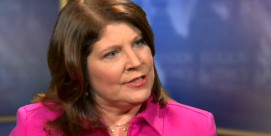In This Episode << SLIDE LEFT TO SEE ADDITIONAL SEGMENTS
Same-Sex Marriage and the Supreme Court
TIM O’BRIEN, correspondent: Four years ago, voters in California approved Proposition 8, an amendment to the state’s constitution banning same-sex marriage in the state, only to have it overturned two years later by a federal judge who said the amendment denied gays and lesbians the equal protection of the law guaranteed by the U.S. Constitution.
THEODORE OLSON (Attorney for plaintiffs in Prop 8 case): “Today, we are more American because of this decision…”
O’BRIEN: …a huge decision that would require all states to recognize gay marriage should the U.S. Supreme Court agree.
The second case involves the federal Defense of Marriage Act—DOMA, for short. The law denies same-sex couples who marry the same federal benefits routinely accorded heterosexual marriages, including many tax benefits like the right to file a joint return.
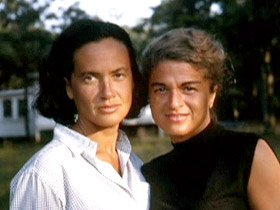 DOMA is being challenged by Edie Windsor, whose relationship with Thea Spayer spanned more than 40 years. They had met in the early sixties and were at one another’s side for decades. They registered in New York City as domestic partners as soon as they could in 1993. But they wanted much more.
DOMA is being challenged by Edie Windsor, whose relationship with Thea Spayer spanned more than 40 years. They had met in the early sixties and were at one another’s side for decades. They registered in New York City as domestic partners as soon as they could in 1993. But they wanted much more.
Edie Windsor: “We want to do the vows and we want to exchange rings.”
O’BRIEN: Spayer had been stricken with multiple sclerosis, and her health was failing. But that did not keep her and Edie from hopping a plane to Toronto, Canada, where in 2007 they were wed.
Thea Spayer: “I Thea Spayer, choose you…until death do us part.”
O’BRIEN: Two years later Thea passed away, leaving the bulk of her estate to Edie, now 83, which resulted in an estate tax bill of $363,000. Even though New York recognized their marriage, Edie did not qualify for the marital deduction allowed heterosexual marriages because of the Defense of Marriage Act.
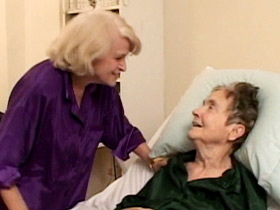 A federal appeals court in New York found that also violated the guarantee to equal protection, but went much further. After noting a long history of discrimination against gays and lesbians, the court concluded any law that makes distinctions based on sexual orientation must be subjected to “heightened scrutiny,” and the government must present “exceedingly persuasive” proof that the distinctions further “an important government interest.” Should the U.S. Supreme Court agree, it would be much more difficult for Congress or any city or state to discriminate against gays and lesbians on anything, not just marriage.
A federal appeals court in New York found that also violated the guarantee to equal protection, but went much further. After noting a long history of discrimination against gays and lesbians, the court concluded any law that makes distinctions based on sexual orientation must be subjected to “heightened scrutiny,” and the government must present “exceedingly persuasive” proof that the distinctions further “an important government interest.” Should the U.S. Supreme Court agree, it would be much more difficult for Congress or any city or state to discriminate against gays and lesbians on anything, not just marriage.
The Justice Department ordinarily defends laws passed by Congress, even those it doesn’t like. But after the New York court’s decision, President Obama said his Justice Department would no longer defend DOMA in court:
President Barack Obama:“DOMA, the Defense of Marriage Act, is unconstitutional, and so we’ve said we cannot defend the federal government poking its nose into what states are doing and putting the thumb on the scale against same-sex couples.”
O’BRIEN: Those who had fought for passage of the Defense of Marriage Act were understandably dismayed.
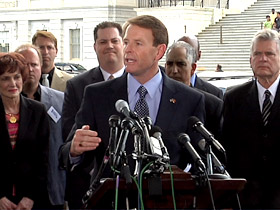 Tony Perkins (President, Family Research Council): “This is about what our children are going to be taught in elementary school. It is about stepping in between a parent and their child and imposing a new morality, or absence thereof, upon our children.”
Tony Perkins (President, Family Research Council): “This is about what our children are going to be taught in elementary school. It is about stepping in between a parent and their child and imposing a new morality, or absence thereof, upon our children.”
O’BRIEN: Republican leaders in the House said they would defend the law themselves:
John Boehner (Speaker of the House): “I raised my hand to uphold and defend the Constitution of the United States and the laws of our country, and if the Justice Department was not going to defend this act passed by Congress, well, then we will.”
O’BRIEN: Whether the House has the legal right to defend the law in the Supreme Court is unclear. A similar question arises with Prop 8 in California, where the state has also decided not to defend that law, giving the justices an easy out for a narrow decision or to sidestep the issue altogether if they choose.
Historically, the court moves very slowly on social issues—following the trends, rarely leading them. The court took the lead in 1954, desegregating the nation’s schools, igniting the civil rights movement. Resistance was massive, however. It wasn’t until 1967 that the court got around to addressing interracial marriage in the case of Richard and Mildred Loving, who were convicted of violating Virginia’s law against interracial marriage, a felony punishable by prison.
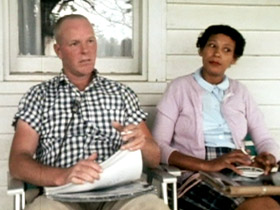 Richard Loving (Plaintiff in Loving v. Virginia): “They sentenced us to one year in the state penitentiary. Then they suspended for 25 years and said that we had to leave the state.”
Richard Loving (Plaintiff in Loving v. Virginia): “They sentenced us to one year in the state penitentiary. Then they suspended for 25 years and said that we had to leave the state.”
The Supreme Court ruled 9-0 to throw out their convictions, Chief Justice Earl Warren writing, “The freedom to marry has long been recognized as one of the vital personal rights essential to the orderly pursuit of happiness.”
Virginia’s law “had no legitimate overriding purpose independent of invidious racial discrimination.” The decision went against public opinion. Interracial marriage was illegal in 16 states at the time, and a Gallup poll showed 73 percent of those surveyed disapproved of it. Race relations have come a long way since 1967, and proponents of same-sex marriage see similar progress for gays and lesbians.
LEE SWISLOW (Executive Director, Gay & Lesbian Advocates & Defenders): I think this is an area in which we’ve seen tremendous movement over the last 15 or 20 years, and people are on a journey. I mean, as a lesbian I had to go through my own journey when the community first started talking about marriage, and I was, like, are you kidding? Marriage? It’s not for us. That’s never been for us. And yet, as I thought about it I realized I do want to get married. Once I let myself believe it was possible, I want to marry the woman I love.
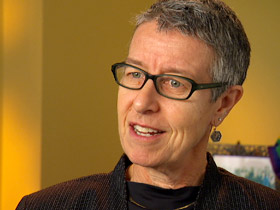 O’BRIEN: The court will not be writing on a blank slate. Twenty years ago, the justices threw out a constitutional amendment in Colorado that would have prevented cities from protecting gays from discrimination, and in 2003, the court rejected a Texas law that made gay sex a crime. Justice Anthony Kennedy, whose vote could be critical on the same-sex marriage question, wrote both decisions and in striking down the Texas law said this about gays and the gay lifestyle:
O’BRIEN: The court will not be writing on a blank slate. Twenty years ago, the justices threw out a constitutional amendment in Colorado that would have prevented cities from protecting gays from discrimination, and in 2003, the court rejected a Texas law that made gay sex a crime. Justice Anthony Kennedy, whose vote could be critical on the same-sex marriage question, wrote both decisions and in striking down the Texas law said this about gays and the gay lifestyle:
Justice Anthony Kennedy audio: “The petitioners are entitled to respect for their private lives. The state cannot demean their existence or control their destiny by making their private sexual conduct a crime. Their right to liberty under the due process clause gives them the full right to engage in their conduct without intervention of the government. It is the promise of the Constitution that there is a realm of personal liberty which the government may not enter.”
O’BRIEN: Justice Kennedy insisted the court’s opinion did not directly apply to same-sex marriage, but dissenting Justice Antonin Scalia saw it differently:
Justice Antonin Scalia audio: “At the end of its opinion, the court says that the present case ‘does not involve whether the government must give formal recognition to any relationship that homosexual persons may seek to enter.’ Do not believe it. Today’s opinion dismantles the structure of constitutional law that has permitted a distinction to be made between heterosexual and homosexual unions.”
O’BRIEN: A federal appeals court in Boston agreed with Scalia’s interpretation and last May became the first federal appeals court to throw out DOMA, citing Kennedy’s decision in the Texas case as authority. The rules governing marriage, like the rules governing divorce, have historically been left to the states, and they differ from state to state, like how old do you have to be to get married, and what do you do to get out of a marriage? The issue of same-sex marriage is widely expected to divide the court along liberal-conservative lines, but not necessarily. Lee Swislow of Gay & Lesbian Advocates & Defenders says there is a “state’s rights” component in the case that could win over some conservative justices.
SWISLOW: When a state says you’re married, does the federal government, as it has always done in the past, agree with that state definition? This is the first time that the federal government has ever reached in and said, “We don’t care what you say, state. We’re going to have our own definition of marriage.” And we don’t think there’s any legitimate reason for the federal government to take this unprecedented action.
O’BRIEN: Throwing out DOMA would not require all states to recognize gay marriage, but striking Prop 8 possibly could. A number of mainstream religious groups do not support gay marriage.
JIM GARLOW (Founder, Pastors’ Rapid Response Team): Authentic, biblical, historic, orthodox Christianity has always affirmed marriage being one man and one woman.
O’BRIEN: And the court in New York addressed the religious concerns, distinguishing civil marriage from holy matrimony. Judge Dennis Jacob wrote “the law is not concerned with holy matrimony. A state may enforce and dissolve a couple’s marriage, but it cannot sanctify or bless it. For that, the pair must go next door.” That the country has become more tolerant of homosexuality would seem to be unmistakable, and it may also be irreversible.
For Religion & Ethics NewsWeekly, I’m Tim O’Brien in Washington.
BOB ABERNETHY, host: For more on religious groups and same-sex marriage, I am joined by Kim Lawton, managing editor of this program. Kim, this is a tremendously powerful and divisive issue for religious groups, isn’t it?
KIM LAWTON: It is and these cases are going to be really, really important for these religious groups. They’re going to be very involved on both sides of the issue. Some of the strongest opposition to gay marriage at the legislative level, at the court level, has come from religious groups, especially evangelical groups, Roman Catholics; the Roman Catholic bishops have been speaking out in favor of traditional marriage. So I expect there’s going to be a robust amount of activity not only in terms of these religious groups writing friend-of-the-court briefs and telling the High Court what they think about the issue, but also at the grass roots. I’ve already been getting emails about prayer campaigns that are being organized. For example, the bishops after Christmas are doing a prayer campaign to support what they call traditional marriage, life, and liberty.
ABERNETHY: And how do they divide up? Catholics and evangelicals are one, but it’s not all one or the other, is it?
LAWTON: Exactly. There are growing movements within the religious community in support of gay marriage. There are religious groups who look at this as a matter of equality and justice. Jewish groups have been—Reform and Conservative Jews have been very supportive of gay marriage. Orthodox—not in the Jewish community; in the Christian community a little more complicated. Certainly while the Roman Catholic Church at the hierarchy is opposed, you have grass-roots groups, like there’s a group called Equally Blessed that says you can be a faithful Catholic and still support this on an equality issue. And then a lot of the mainline denominations really torn over the issue. United Church of Christ and Unitarians support gay marriage, but a lot of the other ones still define marriage as between a man and a woman.
ABERNETHY: And I think about conflict within one congregation, for instance, not only within the members of the congregation, but the bind the pastor can be in if the state says one thing and the Bible says another.
LAWTON: Well, exactly. This has been an issue in some cases where in states that have legalized gay marriage and the pastors are in denominations that don’t recognize it, and so congregants who are gay come to them and say we want to be married in a church, but the pastor says, well, our denomination doesn’t allow that.
ABERNETHY: Kim Lawton, many thanks.



